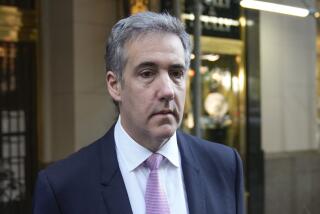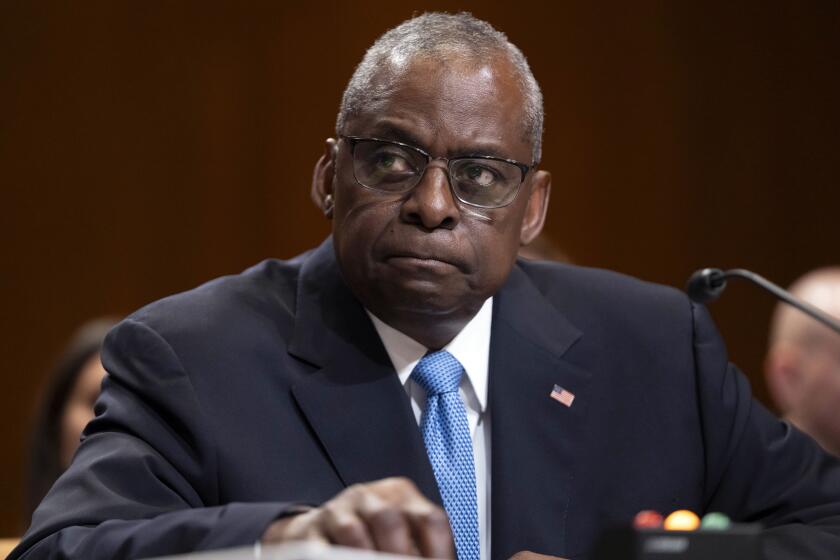Politics 88 : Democrats Sing Pro-Israel Chorus --but a Few Sour Notes Are Heard
It happens almost every four years about this time. With the New York primary coming up and the voting in New Jersey and California just over the horizon, Democratic presidential candidates pledge their steadfast support for Israel and accuse the U.S. Administration of being only lukewarm in its backing of the embattled Jewish state.
The pro-Israel chorus is rising right on time. But this year there are pitfalls in what is usually the safest of political stands because traditional Democratic constituencies are split in their response to continuing violence in the Israeli-occupied West Bank and Gaza Strip.
Although most recognized Jewish leaders continue to express across-the-board support for Israel and to imply that the votes of the Jewish community will go to the candidate who is most uninhibited in his support for the Jerusalem regime, many liberal Democrats--both Jews and Gentiles--are uneasy with Israel’s use of live ammunition and beatings in its so-far unsuccessful attempt to break the back of a Palestinian uprising.
Stakes Particularly High
The stakes are particularly high in the April 19 New York primary, with 255 delegates at stake, because an estimated one-fifth to one-third of the Democratic voters are Jewish. But the issue almost certainly will have a major impact also on the last two major primaries, in California and New Jersey in early June, because of the high numbers of Jewish voters in both states.
The Rev. Jesse Jackson probably forfeited most of the Jewish vote four years ago with his quips about New York as “Hymietown” and his relationship with black Muslim leader Louis Farrakhan. But Jackson, with his solid base of support among black voters, needs the Jewish vote far less than his white rivals--Massachusetts Gov. Michael S. Dukakis and Sens. Albert Gore Jr. and Paul Simon. All three say they are strong backers of Israel, with Gore waging an especially aggressive campaign to establish himself as the strongest supporter of the Jerusalem government.
“The differences could not be starker and New Yorkers could not have a clearer choice,” Gore said Tuesday in an address to the Conference of Presidents of Major Jewish Organizations in New York. He accused Dukakis of “naive legalism, an exaggerated faith in the United Nations and a seeming reluctance to ever have the United States act on its own when necessary.”
Gore, who needs a strong finish in New York to remain a viable candidate, earlier criticized the Reagan Administration for trying to pressure Israeli Prime Minister Yitzhak Shamir to go along with Secretary of State George P. Shultz’s Middle East peace initiative, which calls on Israel to withdraw from territory it occupied in the 1967 Arab-Israeli war in exchange for peace with its Arab neighbors.
‘Short Shrift’
He said Shultz had given Shamir’s objections to the plan “short shrift.”
Gore said he refused to join 30 other senators, all traditional supporters of Israel, in signing a letter criticizing Shamir for shunning the territory-for-peace formula. The letter, made public just before Shamir arrived on an official visit to the United States earlier this month, is more critical of Arab states than it is of Israel but even the mild censure of Jerusalem has proved to be hotly controversial.
Dukakis said the unrest in the West Bank and Gaza could have been avoided if the Arab world had accepted Israel’s right to exist 40, 30 or even 10 years ago. He said Arab leaders are a greater obstacle to Middle East peace than is Israel. But he said the Shultz plan was “a good starting point” for solving the Arab-Israeli dispute. And he said he would have signed the letter if he had been a senator.
Simon, like Gore in a do-or-die battle in New York, fits between Gore and Dukakis on the issue. In a campaign statement, Simon refers to himself as “a strong supporter of Israel in Congress” and says the U.S. support for Israel “must continue to be ironclad.” He endorses the objectives of the Shultz initiative without specifically backing the secretary of state’s plan for a settlement.
According to campaign aides, Simon was away from Washington when the senators’ letter was being circulated for signature. The aides say Simon has not said if he would have signed the document.
Although there are divisions within the Jewish community over Israel’s West Bank and Gaza policy, most politicians apparently believe that Israel’s strongest supporters will concentrate on the Middle East issue in deciding how to cast their vote while critics of the Jerusalem government are more likely to base their vote on other issues as well.
Robert K. Lifton, newly elected president of the American Jewish Congress, predicted that most candidates would confine themselves to “the Pablum” of simply repeating support of Israel without trying to deal with the complex issues of Middle East peace and the Palestinian uprising against Israeli occupation.
‘Filled With Land Mines’
“To a politician, this (issue) is filled with land mines,” Lifton said. “The best thing to do is nothing.”
However, Long Island Democratic political leader Julius Ullman said Gore has won a tactical victory over Dukakis by positioning himself closer to the Israeli prime minister.
“Dukakis is going to be in a bind,” Ullman said. “Gore will obviously get enormous political advantage and Dukakis will pay a price.”
Dukakis, Gore and Simon all criticized the Reagan Administration for putting the Middle East peace process on the “back burner” for most of its tenure.
The contest between Gore, Simon and Dukakis to take the most unequivocal stand in favor of Israel is more restrained this year than it has often been in the past. In 1984, former Vice President Walter F. Mondale and former Sen. Gary Hart both promised to move the U.S. embassy from Tel Aviv to Jerusalem, a step the Israeli government has long advocated. Hart claimed that he should receive credit for raising the issue first.
Jimmy Carter, then the incumbent President, lost the New York primary to Sen. Edward M. Kennedy in 1980, apparently because the Camp David conference that led to the Israel-Egypt peace treaty was considered to be insufficiently pro-Israel.
Jackson clearly has opted out of the quest for pro-Israel votes. But even Jackson has been careful to prune from his rhetoric anything that could be considered overtly pro-Arab or anti-Semitic.
He said both Israel and the Palestinians must be more flexible “and accept some of the risks of peace.” He called on the PLO to recognize Israel’s right to exist and on Israel to recognize the PLO as the representative of Palestinians.
“Israel can never be free until the Palestinians are free,” he said.
Seymour Reich, international president of B’nai B’rith, said Jackson has been “very cautious. His rhetoric has been measured.” However, Rabbi Alexander M. Schindler, president of the American Hebrew Congregations and probably the American Jewish leader most critical of Israel’s iron-fist policy in the occupied territories, said Jewish voters “remember (Jackson’s campaign in) 1984. You don’t forget the past.”
Slow to Place Blame
When asked, all four Democrats deplore the violence on the West Bank and Gaza. But they are reluctant to try to place blame.
Earlier this month, Dukakis traveled to Plains, Ga., to visit Carter. The former President described the response of Israeli troops to the Palestinian uprising as “horrible . . . excessive . . . a discredit to Israel.”
Dukakis was asked if he agreed. He responded, “Anytime we have violence and we can’t settle our differences peacefully, it’s regrettable.”
Staff writers Karen Tumulty, Bob Drogin, Robert A. Rosenblatt, Thomas B. Rosenstiel, Ron Harris and Keith Love contributed to this story.
More to Read
Get the L.A. Times Politics newsletter
Deeply reported insights into legislation, politics and policy from Sacramento, Washington and beyond. In your inbox three times per week.
You may occasionally receive promotional content from the Los Angeles Times.






